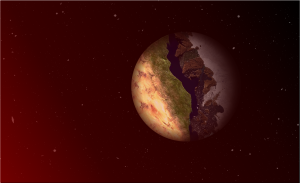- Duck System: A Young Star with Six Exoplanetary Ducklings
 Dr. Corey Beard and their team at UC Irvine have uncovered an extraordinary planetary system nicknamed the “Duck System” by the exoplanet community. With six known planets (potential seventh) and a mention on The Late Show with Stephen Colbert! Blog writer Vidya Venkatesan sat down with Dr. Beard to discuss this remarkable system, the science…Continue Reading Duck System: A Young Star with Six Exoplanetary Ducklings
Dr. Corey Beard and their team at UC Irvine have uncovered an extraordinary planetary system nicknamed the “Duck System” by the exoplanet community. With six known planets (potential seventh) and a mention on The Late Show with Stephen Colbert! Blog writer Vidya Venkatesan sat down with Dr. Beard to discuss this remarkable system, the science…Continue Reading Duck System: A Young Star with Six Exoplanetary Ducklings - Student Spotlight: Hana Schiff
 Hana Schiff Toman is a 3rd year PhD candidate in condensed matter theory who also ran the department’s social media pages for the past two years. She is one of the Science Communication Fellows for the School of Physical Sciences, representing our Department of Physics & Astronomy since Fall of 2022. Hana runs the Department’s …Continue Reading Student Spotlight: Hana Schiff
Hana Schiff Toman is a 3rd year PhD candidate in condensed matter theory who also ran the department’s social media pages for the past two years. She is one of the Science Communication Fellows for the School of Physical Sciences, representing our Department of Physics & Astronomy since Fall of 2022. Hana runs the Department’s …Continue Reading Student Spotlight: Hana Schiff - Exploring the Twilight Zone on Extrasolar Planets
 Over 6000 exoplanets, planets orbiting stars other than our Sun, have been discovered, offering a glimpse into the vast diversity of planetary systems beyond our own. As our technological capabilities continue to advance, this number is expected to rise, and many exoplanets will be unveiled. Amidst this cosmic diversity, one question prevails: how do we…Continue Reading Exploring the Twilight Zone on Extrasolar Planets
Over 6000 exoplanets, planets orbiting stars other than our Sun, have been discovered, offering a glimpse into the vast diversity of planetary systems beyond our own. As our technological capabilities continue to advance, this number is expected to rise, and many exoplanets will be unveiled. Amidst this cosmic diversity, one question prevails: how do we…Continue Reading Exploring the Twilight Zone on Extrasolar Planets - Student Spotlight: Tyler Smith
 Tyler Smith is a 4th year Ph.D. student in astro-particle physics who also serves as a leader in the Physics Grad Caucus (PGC) and Physics and Astronomy Community Excellence (PACE). His contributions have greatly improved both programs, and thus the graduate experience at UCI. He says he loves interacting with fellow colleagues through mentoring and…Continue Reading Student Spotlight: Tyler Smith
Tyler Smith is a 4th year Ph.D. student in astro-particle physics who also serves as a leader in the Physics Grad Caucus (PGC) and Physics and Astronomy Community Excellence (PACE). His contributions have greatly improved both programs, and thus the graduate experience at UCI. He says he loves interacting with fellow colleagues through mentoring and…Continue Reading Student Spotlight: Tyler Smith - What is JWST
 We are thrilled to share the science of the James Webb Telescope (JWST) and how UCI scientists are involved in using this incredible tool for their work. The JWST is a successor of the Hubble telescope and is one of the finest telescopes humanity has ever built, with the most giant mirror for any space…Continue Reading What is JWST
We are thrilled to share the science of the James Webb Telescope (JWST) and how UCI scientists are involved in using this incredible tool for their work. The JWST is a successor of the Hubble telescope and is one of the finest telescopes humanity has ever built, with the most giant mirror for any space…Continue Reading What is JWST